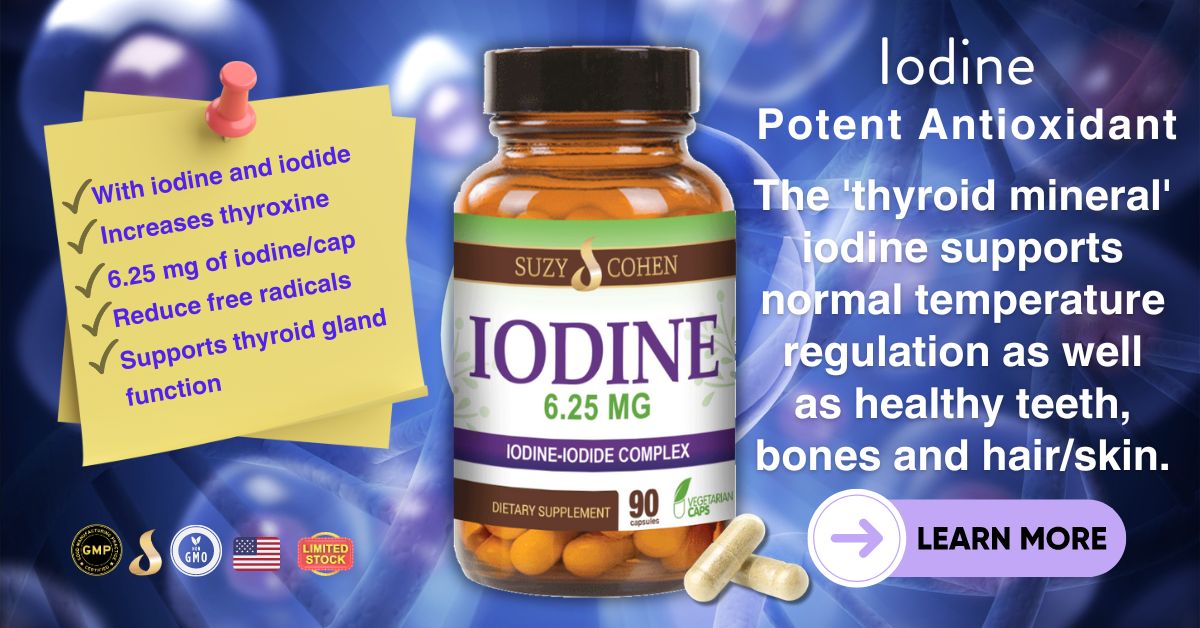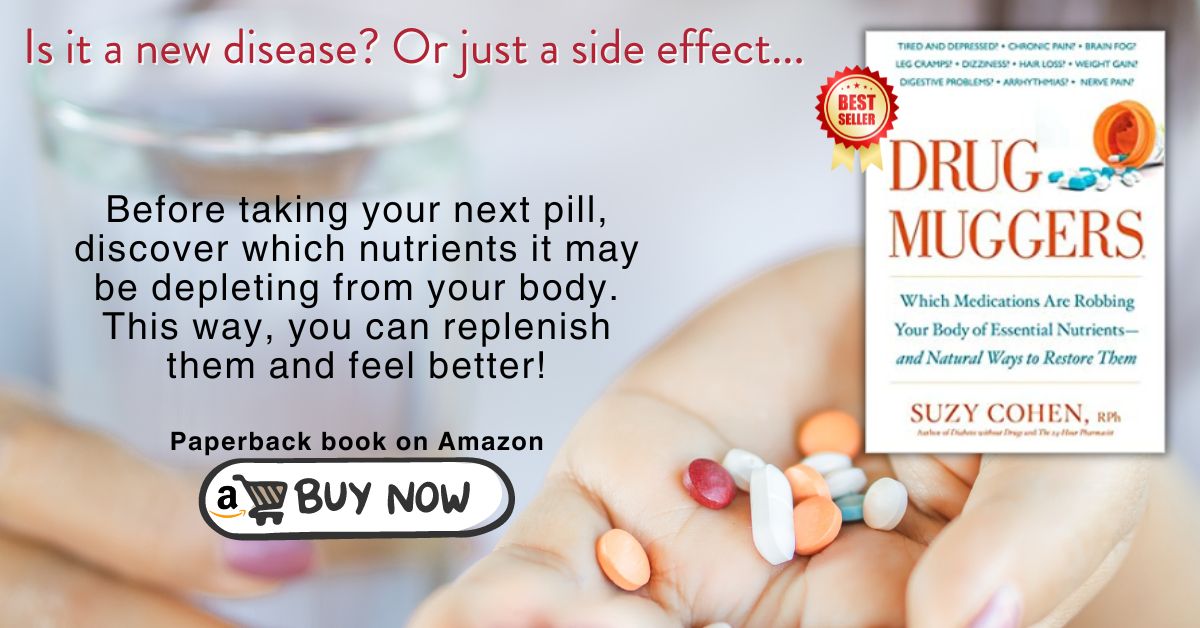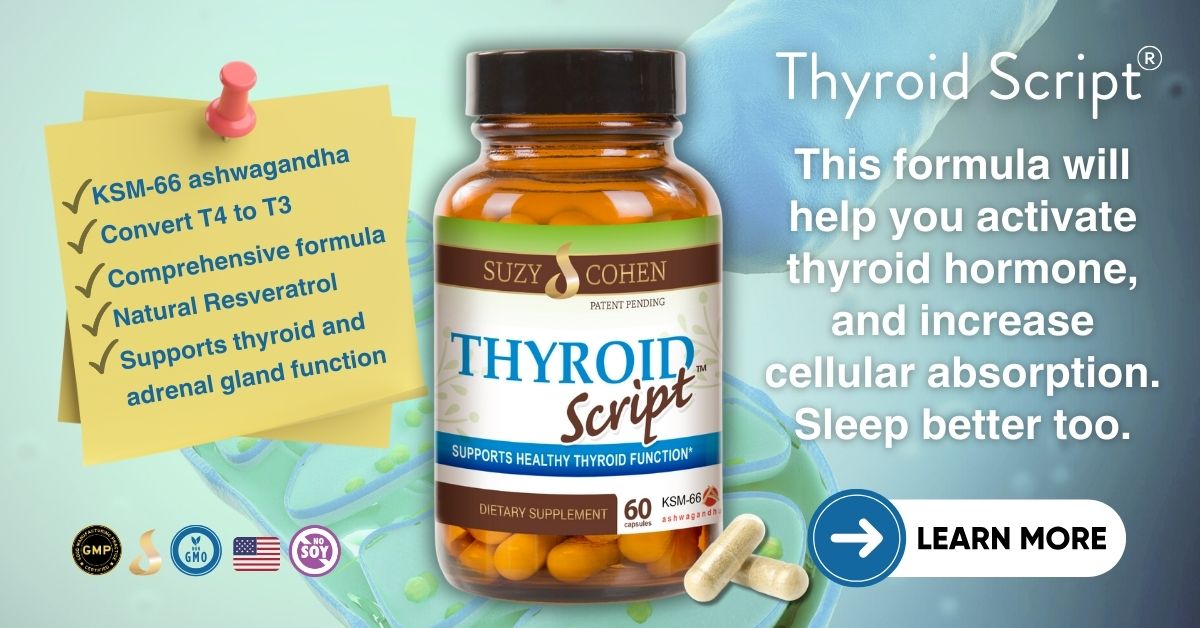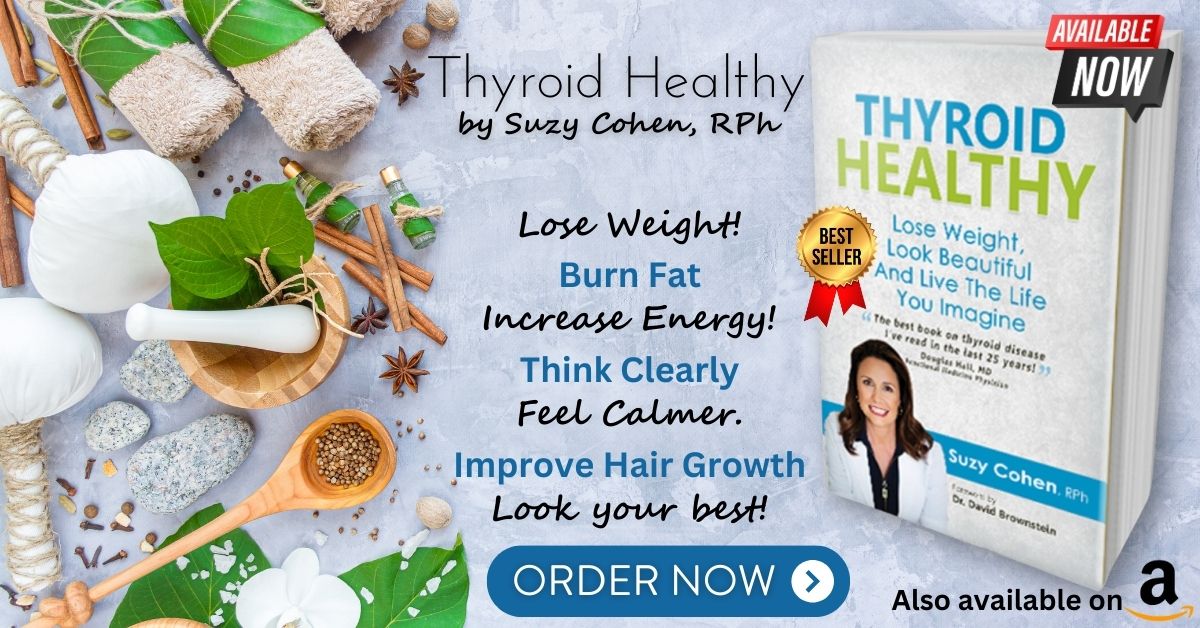What's On This Page?
ToggleThere’s mass confusion and paranoia about iodine, and that’s what prompted me to write today’s article. It actually dawned on me last night (while talking to a person with Hashimoto’s thyroiditis) that iodine is used all over your body. She thought it was just used by your thyroid, and read someone’s blog about it, and became very afraid to take it. It’s in salt, the “iodized” salt, but that is not nearly enough iodine for many of you.
Although iodized salt has been the most effective public health initiative to attempt to reduce iodine deficiency, and thus hypothyroidism (and cretinism), it’s not that practical. The advocates will say it costs less than 5 cents to “iodize” a ton of salt, but the opponents feel that the amount of iodine isn’t enough, and besides, you’ll get hypertension from all the sodium in salt if you try to use it for replenishment.
So today, I want to clear up the confusion about this important trace mineral. Here are 7 Reasons to consider eating more or supplementing with it:
1) Iodine is needed and essential for your thyroid and proper thyroid hormone production.
2) Iodine is needed for proper conversion of T4 to T3 as well as utilization of thyroid WITHIN your cells.
3) It is NOT just for your thyroid, it’s needed in ALL of your cells because each and every cell has a receptor for it.
4) Iodine is especially important for your breasts and prostate. If you have a disorder with your breasts or prostate, the first thing you should do is check your levels of iodine, God forbid if it’s deficient, your risk for reproductive cancers becomes much higher.
5) If you have a documented allergy to shellfish, or to contrast media used during imaging tests (MRIs, CTs), that is not an allergy to iodine. Reactions to contrast media are likely due to the high osmolar or ionic content of the actual dye. The primary allergen in shellfish that causes your allergy or anaphylaxis is called tropomyosin.
I know many, many people who are deathly afraid of supplementation because they’ve had a reaction to shellfish/seafood, but again, that is not usually to iodine. You may want to read another important article that clears confusion, I wrote this to help people with seafood allergies: The Truth About Shellfish Allergies And Iodine Deficiency.
6) If your primary source of iodine is from salt, by the time you get enough iodine, you’d have to eat so much salt that your sodium levels would SKYROCKET! It’s not a good idea to depend on iodized salt for iodine. It’s bad for blood pressure. Besides that, typical table salt is stripped of 80 minerals to its bare backbone of NaCl (sodium chloride) so it is nutritionally naked. I carry my own unrefined sea salt in my pocket because plain table salt isn’t what I want.
7) Iodine deficiency is associated with impaired mental development.
Consider Iodine Supplementation
Iodine supplementation can improve health on every level, however it’s not for every single person reading this today.
I don’t think you should take any healthy mineral randomly, not iodine, not magnesium, calcium, potassium, or lithium. But if you NEED a particular mineral, then it’s okay, it can change your life within a few days. Hopefully, my article today will quell some fears.
How do you know if you need iodine?
Testing is possible. I will get to that momentarily.
Signs of Iodine Deficiency Match Up with Hypothyroidism
Fatigue, weakness or apathy
Brain fog or mental disability
Dry skin or brittle nails
Hair loss
Miscarriage
Constipation
Depression or sluggishness
Congenital hypothyroidism (a.k.a. cretinism), this is when babies are born with severe mental challenges, they may be deaf, mute or have spastic disorders of their arms and legs. It occurs because mother is insufficient in iodine, and therefore thyroid hormone.
Since iodine is used all over your body, in all of your organs especially your breasts and prostate, you need to make sure you read this and forward it to every man and woman you love. The truth is, TRILLIONS of cells have a receptor site for iodine and NEED it for their very survival.
Sadly, many of you are starving yourself of iodine because of fear. Perhaps you read about dangers of taking too much, or maybe you read that iodine is a radioactive mineral. (It is when it’s used as the drug for Graves’ disease). Want to learn a little more about Graves’ disease? READ THIS to find out one important nutrient that could help support antioxidant capabilities.
But I assure you natural iodine -the type I am talking about today- is not radioactive, that is silly! It is as natural (and needed) just like other minerals including magnesium, calcium, potassium, selenium, chromium and others.
We are not afraid of those.
Whenever there is an area of radioactivity, like Chernobyl, Fukushima, and possibly UKRAINE now, everyone rushes to buy iodine, either SSKI, or Nascent iodine or other forms of Iodone, and they do that to protect their thyroid.
You see, natural iodine helps to displace radioactive iodine. It’s a little more complicated than that, but the point is NATURAL iodine is needed as a form of protection from the radioactive sort. An article a few weeks ago in August 2015, was entitled, “Fukushima Disaster Causes a Dramatic Increase in Thyroid Cancer.”
I wrote a blog about this as well, The Connection Between Ukraine and Iodine.
There are at least 103 new diagnoses this year alone, which is staggering for the area. It’s not from natural iodine, it’s from radioactive iodine. Ah, but that is possibly what conjures up the fear. Natural iodine is protective to the thyroid gland, it does not cause thyroid cancer!
Fear of Iodine is Unfounded
The fear surrounding iodine leaves many innocent people with uncomfortable conditions such as thyroid disease (it’s epidemic now), prostate problems, breast cancer and fibrocystic breast disease. When you test women with those disorders, they are almost always deficient.
Natural iodine is not the same as radioactive iodine which is used in Graves’ disease and also found near nuclear facilities. The body cannot thrive without natural iodine. Right now, I’ll share examples of how important natural iodine is to you, because I have a feeling no one has mentioned this before:
* Iodine has well-documented research when it comes to healthy breast tissue and women will often claim iodine alleviated fibrocystic breast pain or breast lumps.
* Iodine may help shrink uterine fibroids; in fact, one of the very first conventional treatments for severe fibroids was to paint a woman’s uterus with iodine!
* There’s a correlation between reduced iodine and lower mental IQ. A developing fetus is particularly susceptible to brain damage if the pregnant mother is severely iodine deficient, so much so that there are initiatives all over the world to fortify pregnant and lactating mothers with iodine to ensure healthy brain development.
According to Dr. David Brownstein, author Iodine: Why You Need It, Why You Can’t Live Without It, the amount of iodine in prenatal supplements is woefully deficient and what he calls “a public health disaster.”
The right amount of iodine is absolutely crucial to a pregnant or lactating mother because too much (as well as too little) will lead to hypothyroidism. Iodine has a very “narrow therapeutic index.” I have many physicians reading this so I will now post the conclusion from April 2015, Journal of Clinical Endocrinology and Metabolism, where researchers evaluated over 7,000 women:
“The upper limit of iodine intake during early pregnancy in an iodine-sufficient region should not exceed UIC 250 μg/L, because this is associated with a significantly high risk of subclinical hypothyroidism, and a UIC [urinary iodine concentration] of 500 μg/L should not be exceeded, as it is associated with a significantly high risk of isolated hypothyroxinemia.” Here’s the link for the study.
* Iodine deficiency is a risk factor for thyroid cancer. This has been shown in several different papers and trials, most recently discussed in Thyroid Research (June 2015). The right amount of iodine is crucial, too little or too much will harm your thyroid which sucks up iodine like a sponge.
* Iodine deficiency is well-documented and known to cause or at the very least contribute to hypothyroidism, goiters and autoimmune thyroid disorders like Hashimoto’s.
* Iodine supports testicular and prostate health so it’s important for men to get their levels tested and supplement if needed before BPH or prostate cancer occurs.
* Iodine status determines nodule growth. Most goiters and nodules are due to iodine deficiency; there are a subset of patients who may develop a goiter from “iodide” deficiency.
* The antioxidant mineral supports our reproductive organs. There is a lot of research done on breast, endometrial, and ovarian cancer and natural iodine. In 1976, Lancet concluded, “Increasing dietary iodine intake may reduce the risk of these cancers.”
What in the world is happening…
Initiatives to fortify foods with iodine have been ongoing in New Zealand, Denmark, the United Kingdom, and other countries where iodine is actually revered instead of feared. According to the World Heath Organization guidelines, systematic iodine prophylaxis is recommended in women planning a pregnancy, during gestation and lactation in order to prevent maternal, neonatal and infantile consequences of mild-to-moderate deficiency.
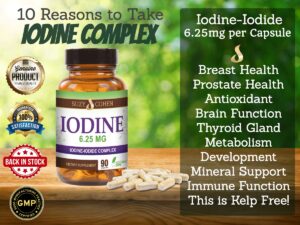
I can only sadly imagine all the women in this country who fear iodine who become pregnant while deficient! Testing (properly) should be mandatory for all pregnant women. Methylation testing should be too, and you can read more about that in my other article, Methylation Problems Lead To 100s Of Terrible Diseases.
The low-salt diet advocated by many physicians may have certain merits, but all-in-all, it is a disaster for your thyroid. Not that “iodized” salt is the answer, I don’t think so, but natural UNREFINED sea salt with some color is! Everyone who is on a low-salt diet is probably iodine deficient.
Did you know that low iodine is a contributing factor for AFIB, cardiac arrhythmias and congestive heart failure?
The Problem With Salt
Aside from mass confusion and fear, we have the problem of nutritionally naked salt. Let me emphasize this part:
1. Fortified “iodized” salt contains only iodide. That’s only half of what your body craves, in terms of iodine. The body needs BOTH iodide and iodine, there are two forms of the mineral.
2. Your thyroid craves the iodide form.
3. Your breast and prostate crave the iodine form.
That’s why high-quality forms of iodine supplements contain it in it’s COMPLEXED form.
But here’s the catch, if your body can’t convert the iodide to iodine, your breasts and prostate suffer.
That’s why supplemental forms appear to be more useful to certain people. If you try to eat more salt in order to get more of the mineral you will kill yourself because you’d have to eat pounds. Again, eating salt is not the most ideal way to get iodine into your body.
Another terrible problem is the US-recommended allowance (USRDA). It’s horribly low at 150 mcg (micrograms).
In my professional opinion as a pharmacist, that is not nearly enough to support good health. All of you eat salt, go ahead and test yourself with a urine iodine test and see if you have enough. You may, but you may not. Which brings me to testing…
Testing for Levels
1. Urine. You can test your own levels of iodine with a urine iodine test. No blood is required. The skin patch test is extremely popular, however, it is not too useful in my opinion. It’s almost like a magic trick because it will evaporate on pretty much everyone.
This could lead you to think you’re low in iodine when perhaps you are not, what we call a false positive. So a 24-hour urine catch is a better way to evaluate your status than blood or spot urine. I wrote an entire blog about this so consider reading, Iodine Testing Simplified: Top 6 Iodine Testing Methods Available Now.
2. Blood. If you want to look in the blood, measure your “thyroglobulin” levels, abbreviated as Tg. The thyroglobulin blood tests is a more sensitive biomarker of iodine status than thyrotropin or the thyroid hormones like T3 (triiodothyronine) and/or T4 (thyroxine).
In a paper that reviewed 34 different articles, researchers looked at levels of urinary iodine as well as Tg levels. For the purpose of their review, a median Tg <13 μg/L and a median UIC ≥100 μg/L (UIC ≥150 μg/L for pregnant women) were used to indicate adequate iodine status. They actually excluded all of the studies conducted in subjects with either known thyroid disorders or those with elevated Tg antibodies. All in all, they concluded that Tg was a good biomarker of iodine deficiency.

How Can You become deficient?
Many things can cause you to become iodine deficient, let’s go through those now because they are shocking:
1) GOITROGENS – these are compounds found in foods that you commonly eat; consuming too many goitrogenic foods will cause your body to run low so moderation or avoidance for a few weeks is the key. The goitrogens suppress the body’s absorption of iodine and thyroxine (T4) synthesis.
The most common goitrogenic foods include the crucifer vegetables like broccoli, cauliflower, kale, Brussels sprouts and cabbage. Others include turnips, soybeans, alfalfa and cassava root. Cooking them helps by deactivating the goitrogenic compounds, but the problem is that many of you eat them raw, or they are in your greens drink powder mix, thus you are (over time) suppressing thyroid function by suppressing iodine.
Please read these articles: The Case Against Kale as it Pertains to Your Thyroid.
Be Aware Of Thyroid Risks: 6 Goitrogenic Medications To Understand
2) Swimming pools. Yes, if you’re a swimmer, or you enjoy your hot tub a lot, the chlorine in your water will deplete levels of iodine quickly. You must read this article if you like to swim, or if you have a relatively new car! Thyroid Problems: Identifying And Avoiding 9 Critical Toxins.
3) Showering with regular tap water, instead of one that has a chlorine filter on it. How many of us reading today have a chlorine filter on our showerhead? Probably no one. It’s the same deal as swimming pools. Chlorine can also trash iodine levels because the chlorine competes for the same receptor sites as iodine.
4) Eating white bread, laden with bromine. Bromine found in bread and steals iodine. Good time to tell you, cooking with vegetable oils that are brominated.
5) I saved the best for last, DRUG MUGGERS! That’s my specialty, I have been writing and speaking about drugs that mug essential nutrients since 1999. I wrote the book on it. Did you know that common drug muggers of iodine are among the most widely prescribed drugs in the world? Some of the offenders include fluoroquinolone antibiotics (Levaquin, Cipro, etc), certain antidepressants and cholesterol medicines.
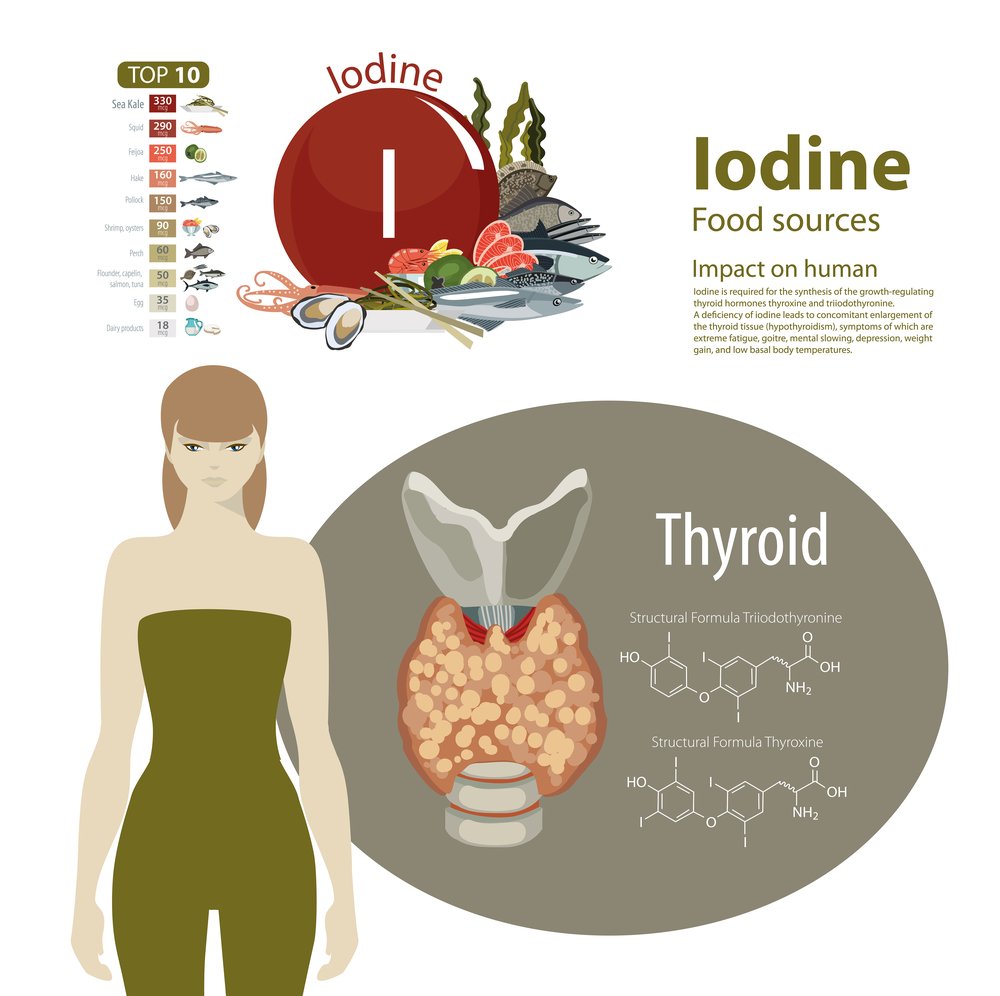
How can you get too much?
1) Yes, by taking medications that contain it. For example, the popular “Cordarone” or “Pacerone” known more commonly as amiodarone, is a drug used for cardiac arrhythmias. It’s extremely popular. It happens to have a very high dose! It can possibly cause thyrotoxicosis. The iodine content in 200 mg pill of amiodarone is a whopping 75mg! That’s per dose!
2) Taking a thyroid supplement that has too much of this mineral in it. Many thyroid-supportive supplements focus on providing nutrients to help your body produce more thyroxine, so they are loaded with iodine. (FYI, my Thyroid Script only contains only 500 mcg, which is half of 1 mg.
That is relatively nothing, many supplements have 6 to 12.5mg in a single pill! Thyroid Script is a stand-alone supplement, it may be all you need to help with thyroid gland structure and function* as well as adrenal health and sleep.*
High doses of iodine, say those above 8 mg taken daily, may be okay for some of you, for a few days or weeks, but it’s not something I recommend on a longterm unless you are routinely monitored and woefully deficient.
Selenium Too?
You would also want to have selenium on board, as selenium primes the body for iodine. Taking selenium is important, once that level is within range, it’s usually safe to begin iodine supplementation. Taking iodine in while being selenium-deficient can cause negative reactions.
Here are some foods rich in this natural element, in case you’d like to eat your way to better status!
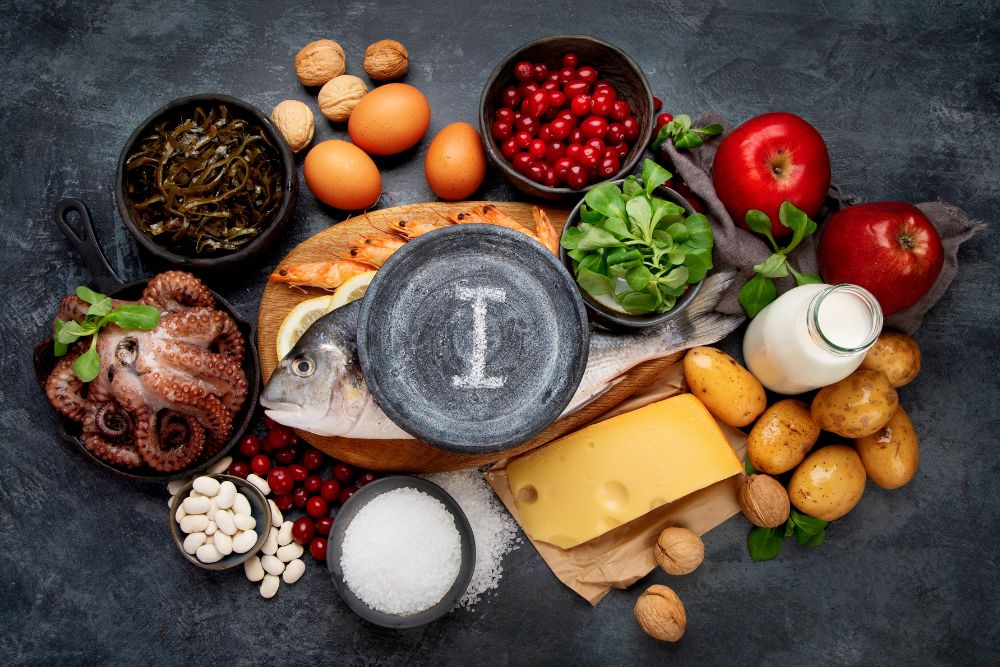
Research led by Dr. Bernet tested 10 different “thyroid support” supplements based upon their popularity among consumers. They found that 9 out of 10 brands tested contained T4 (thyroxine). At the dose recommended on the respective labels, four of the pills delivered would deliver T4 at doses that could produce about 9 to 91 mcg of T4 per day!
Keep in mind, a typical daily dose of prescription Synthroid (also a T4 molecule) ranges on average from 50 to 150 daily mcg. Some of the supplements contain T3, the active form of thyroid hormone.
Many of you take medications like Levoxyl, Synthroid, Armour, and Nature-Throid, so taking a supplement with them could be very dangerous. That’s why I formulated a non-glandular supplement (Thyroid Script) that supports peripheral conversion of T4 to T3, rather than trying to force your body into making more T4. If this is confusing, refer to my book, “Thyroid Healthy: Lose Weight, Look Beautiful and Live the Life You Imagine.”
Recommended Doses Vary
Knowing how much to take can be tricky so I suggest you get your levels tested, don’t overdo it iodine, just take what you need until your levels rise to normal range.
You may feel better because as the iodine binds to the tyrosine in your body, it forms thyroid hormone so your symptoms of low thyroid may disappear, that is one way to know that you have enough. I would stop at that point, not just keep taking it forever and ever.
Like any good thing, too much is incorrect for your body. If I had a specific dose that would work for millions of you reading today’s article all over the world I would offer it gladly, but unfortunately, you are each unique. Some of you may respond to 100 or 200 mcg, and others will need 12 to 24 mg! I have no way of knowing what is right for you based upon your lab work. This kind of thing is to be determined by your doctor, if only through testing every 3 to 4 months.

Suzy Cohen, has been a licensed pharmacist for over 30 years and believes the best approach to chronic illness is a combination of natural medicine and conventional. She founded her own dietary supplement company specializing in custom-formulas, some of which have patents. With a special focus on functional medicine, thyroid health and drug nutrient depletion, Suzy is the author of several related books including Thyroid Healthy, Drug Muggers, Diabetes Without Drugs, and a nationally syndicated column.
